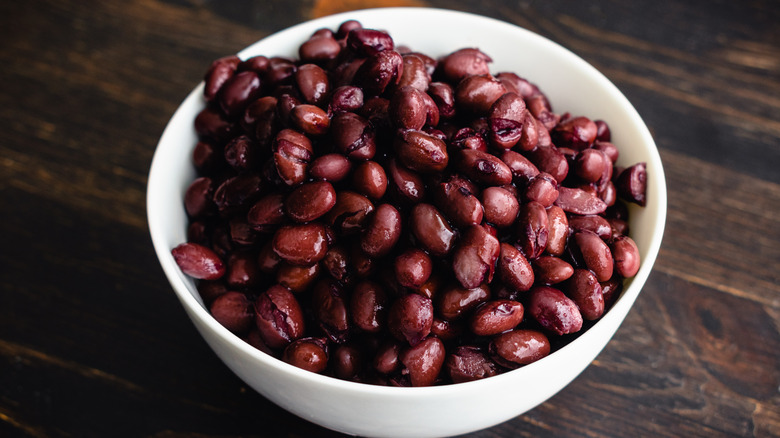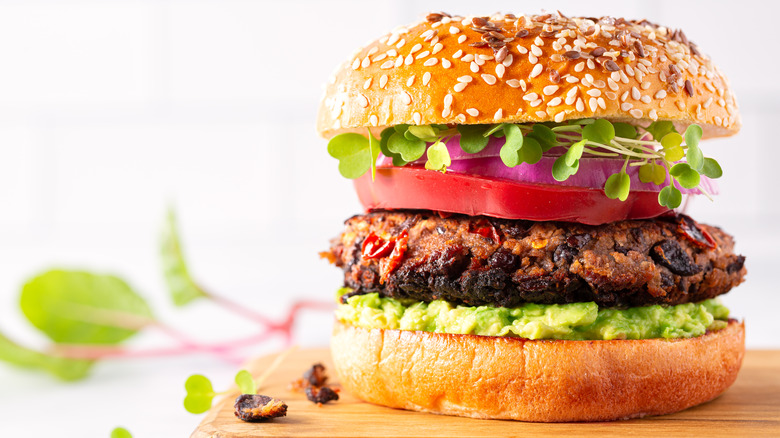Why Tabitha Brown Adds Vinegar And Baking Soda To Canned Black Beans
Canned beans are one of life's greatest conveniences. Just pop the can open, and you've got a meal ready to go. After all, you can eat canned beans without cooking (they're already cooked), so if you wanted to, you could enjoy them straight from the can. You might want to do a bit more before consuming them, however, such as rinsing them first. Then, you can add them to something like a fully-loaded taco salad or turn them into a veggie burger.
For an expert's opinion on the matter, Food Republic turned to Tabitha Brown. Not only is the Emmy-Award-winning actress and host a New York Times bestselling author, but she's also a vegan food influencer with more than 13 million followers. When asked about her process for prepping canned beans for making burgers, Brown said that she always washes them first — and she uses more than just water. "If I do black beans, sometimes I'll do a little bit of baking soda and apple cider vinegar to clean them."
As for why, it boils down to tradition. She referred to this extra step when rinsing beans as "an old folk tale," explaining that "my grandma, my aunts ... they said when you rinse beans, like, you clean them with a little baking soda, a little vinegar, and water ... it takes the gas out of them." Laughingly, she elaborated: "I don't know, beans be giving people gas — listen, TMI or not, but that's why we do it."
The more you rinse, the less you'll toot
TMI or not, Brown's ancestors were onto something. There are some huge mistakes you're probably making with canned beans — including not washing them. There are few solid reasons to rinse canned beans, and the gassiness Brown joked about is a big one. If you've ever felt bloated or flatulent after eating canned beans, then you know that the unpleasant feeling is no joke. While it's perfectly okay to consume the liquid from a can of beans, it's important to note that the bean water is loaded with soluble fiber that leaches out from the beans. This, along with the already fiber-packed beans can tend to make you fart, so rinsing them can make all the difference.
When you soak dried beans with baking soda, it breaks down some of the sugars that can be hard to digest – which is partly why canned beans are foamy when rinsed. It follows then, that rinsing with the help of baking soda, as well as with vinegar for its extra cleaning power, can help remove more than you'd accomplish with just water alone.
Another reason for the post-can wash is to remove salt. Even if you purchase low-sodium beans, the sodium levels may still be much higher than cooking unsalted beans from scratch. Studies have shown that on average, draining and then rinsing beans can remove 41% of the sodium that's packed in the can with them (via The Bean Institute).
Wash canned beans to control sodium and texture
High levels of sodium intake have been linked to hypertension and cardiovascular risks. To address this, daily levels are set by the Chronic Disease Risk Reduction (CDRR), as defined in the Dietary Guidelines for Americans for 2020 – 2025. The level for adults is set at no more than 2,300 milligrams per day. An average can of beans has about 570 milligrams of sodium — equivalent to a quarter of the allotted daily amount. Washing your canned beans will greatly reduce that amount.
Even if sodium isn't much of a concern for you, there are other reasons to rinse your beans. For one, the taste of too much salt can make or break your dish. Plus, the fluid itself can interact with the flavors in your recipes. Furthermore, the canning water often has a viscous, slippery texture, which some people may find off-putting. These issues can affect your cooking in a variety of ways, so eliminating them gives you more control. Rinsing off the liquid allows you to season to your liking and ensures that your spices will better adhere to the food.
After rinsing in water with baking soda and vinegar, Tabitha Brown said, "[I]f I'm using beans for a burger ... I'll proceed to smash them just like I would with chickpeas." To address their texture, she'll then add pecans to vegan black bean burgers, which gives them a surprisingly meaty bite and a nutty depth of flavor.



